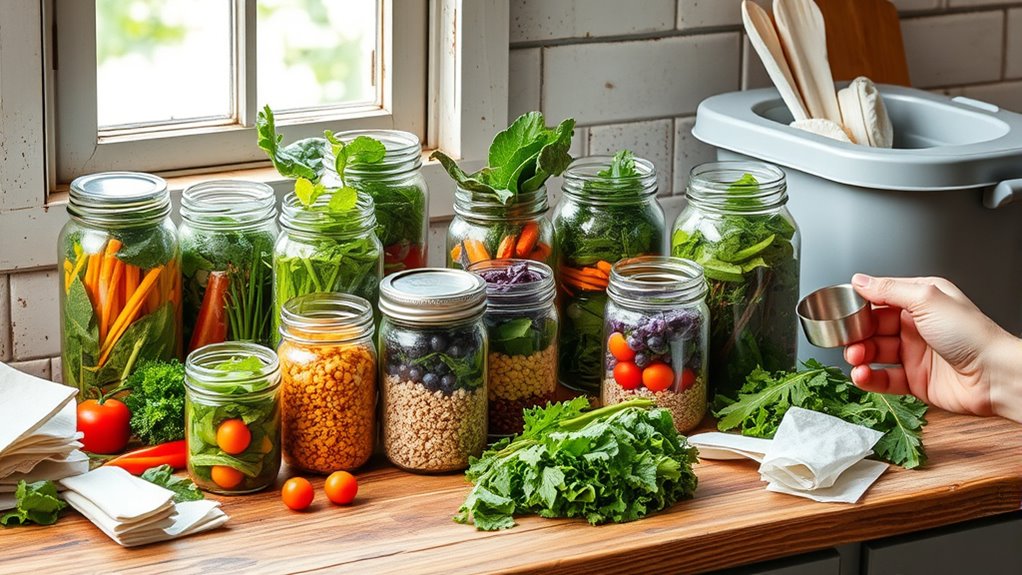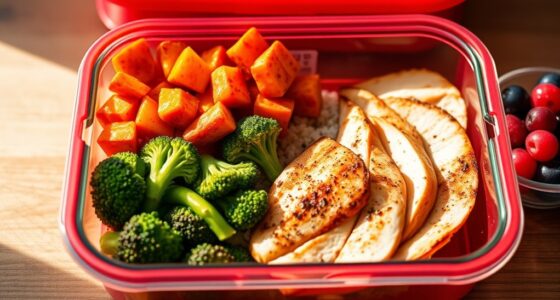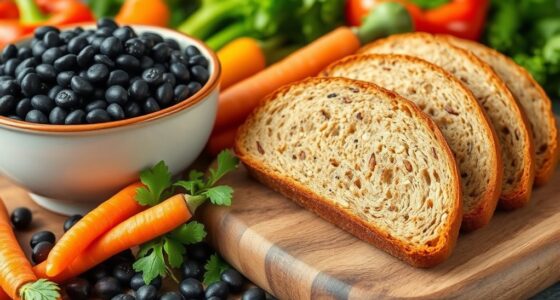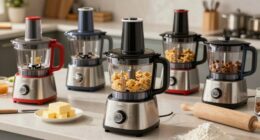To embrace zero-waste meal prep, focus on reducing packaging by using reusable containers, glass jars, and beeswax wraps. Plan your meals ahead to minimize leftovers and avoid impulse buys. Compost organic scraps like veggie peels and coffee grounds to cut down waste. Buy in bulk, prep meals in advance, and use reusable silicone bags for leftovers. These practices promote healthier eating and a more sustainable kitchen—discover more ways to optimize your routine below.
Key Takeaways
- Plan meals ahead to minimize impulse purchases and reduce food waste.
- Use reusable containers, wraps, and bags to avoid single-use packaging during meal prep.
- Incorporate composting for vegetable scraps and food leftovers to enrich soil and divert waste.
- Buy in bulk and refill containers to decrease packaging waste and save money.
- Prepare meals in advance with portion control to prevent spoilage and promote healthy, sustainable eating.

Adopting zero-waste meal prep is a practical way to reduce your environmental impact while saving money and eating healthier. One of the most noticeable ways to do this is by minimizing food packaging. Instead of relying on single-use containers or plastic wraps, you can switch to reusable options such as glass jars, metal tins, or beeswax wraps. These alternatives not only cut down on waste but also keep your food fresh longer. When shopping, bring your own cloth bags and containers, which helps avoid unnecessary packaging at the source. Planning your meals ahead reduces impulse buys and prevents leftovers from going to waste, further lowering your environmental footprint.
Another key aspect of zero-waste meal prep involves mastering composting techniques. Composting allows you to transform vegetable scraps, coffee grounds, eggshells, and other organic waste into nutrient-rich soil for your plants. This process diverts waste from landfills and reduces methane emissions, which are harmful greenhouse gases. To start, keep a small compost bin in your kitchen for easy collection of food scraps. When it’s full, transfer it to a larger outdoor compost pile or use a composting service if available in your area. Properly managing composting techniques, such as balancing green and brown materials and turning the pile regularly, ensures efficient decomposition and minimizes odors. Additionally, understanding composting technology can help optimize the process and improve compost quality. Composting also complements your zero-waste kitchen by giving new life to scraps that would otherwise be discarded, closing the loop on your food cycle.
In addition to reducing packaging waste and composting, you can incorporate other sustainable practices into your meal prep routine. Buying in bulk reduces packaging waste and often saves money. Using refillable containers for liquids or pantry staples minimizes the need for new packaging each time you shop. Preparing meals in advance allows you to portion out servings, avoiding overproduction and spoilage. When storing leftovers, opt for reusable silicone bags or glass containers instead of disposable plastic wrap or foil. This habit not only cuts waste but also keeps your food safer and fresher for longer.
Frequently Asked Questions
How Can I Start Zero-Waste Meal Prep With a Busy Schedule?
You can start zero-waste meal prep by focusing on simple meal planning and effective time management. Dedicate a specific day each week to prepare ingredients in bulk, like chopping vegetables or cooking grains, which saves time later. Use reusable containers to store leftovers and pre-portioned meals. This approach helps you stay organized, reduces waste, and makes healthy, sustainable eating manageable even with a busy schedule.
What Are the Best Reusable Storage Options for Meal Prep?
Imagine never throwing away another piece of plastic again—your meal prep game just got revolutionary! Reusable containers are your best bet, offering durability and style, while eco-friendly wraps keep your food fresh without waste. Invest in glass or stainless steel containers for longevity, and choose beeswax or silicone wraps for versatile, waste-free storage. These options make your kitchen greener and your meals healthier, transforming your routine effortlessly.
How Do I Reduce Food Waste When Shopping for Ingredients?
To reduce food waste when shopping, you should focus on food inventory management and shopping list planning. Check your pantry and fridge first to see what you already have, then make a detailed shopping list to avoid impulse buys. Stick to your list, buy only what you need, and choose versatile ingredients. This helps prevent over-purchasing and guarantees you use everything before it spoils.
Are There Budget-Friendly Zero-Waste Meal Prep Tips?
Yes, you can save money with zero-waste meal prep by doing DIY composting for food scraps and shopping in bulk to reduce packaging. Plan your meals to buy only what you need, minimizing waste and cost. Use reusable containers for storage, and repurpose leftovers creatively. These habits help you stay within budget while contributing to sustainability. Plus, DIY composting turns waste into valuable fertilizer for your garden.
How Can I Adapt Zero-Waste Principles for Special Dietary Needs?
Did you know that over 60% of people have dietary restrictions? To adapt zero-waste principles, you can choose versatile ingredients that meet your needs and explore ingredient substitutions to reduce waste. For example, swap out dairy for plant-based alternatives or use vegetable scraps in broths. This way, you respect your dietary restrictions while minimizing waste, making your meals both sustainable and personalized.
Conclusion
By embracing zero-waste meal prep, you reduce waste, save resources, and nourish your body. You turn leftovers into new creations, minimize packaging, and choose sustainable ingredients. You cook with purpose, plan with mindfulness, and enjoy meals with gratitude. As you make these small changes, you create a healthier planet, a healthier you, and a future full of possibility. Keep these habits alive, and watch your impact grow—one meal at a time, one conscious choice at a time.









